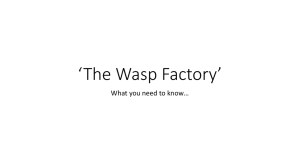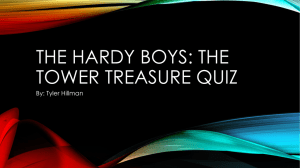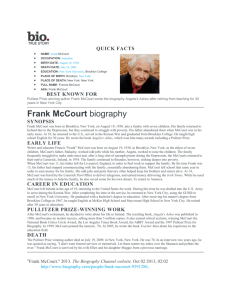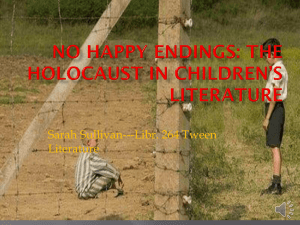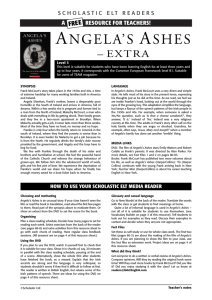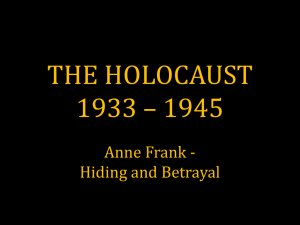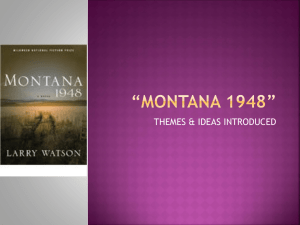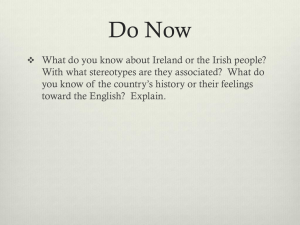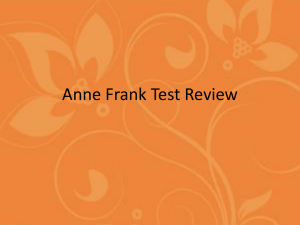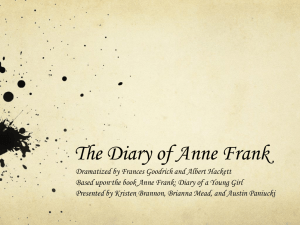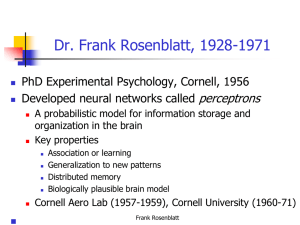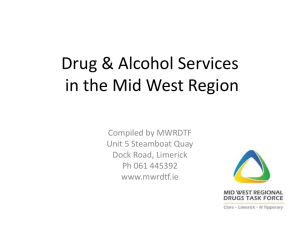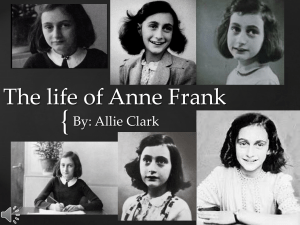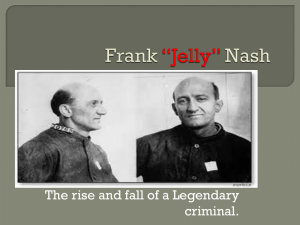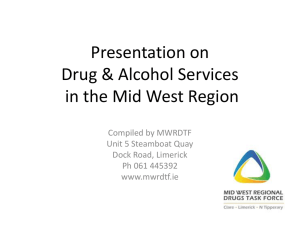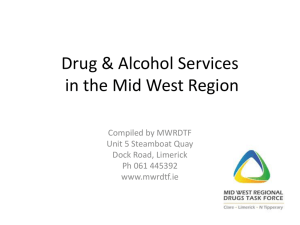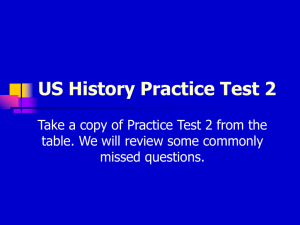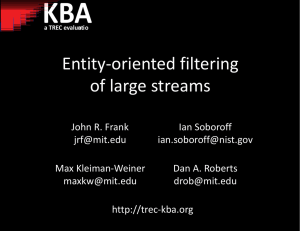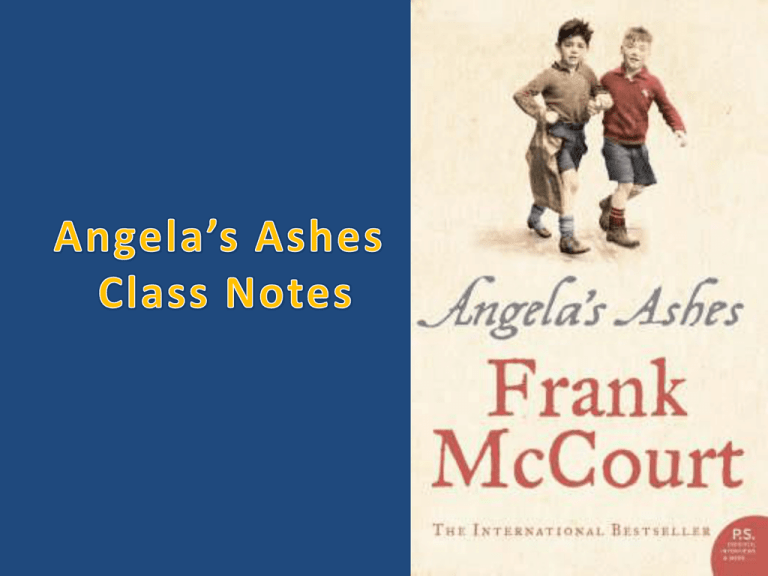
Catholic references abound:
Mick: a Catholic; predominately used as a derogatory term
patron saint: a person who has died and who can
be prayed to; a saint who looks after certain nations or causes
Angelus: traditional Catholic prayer
St Vincent de Paul Society: a Catholic aid agency
Mother o’God: “Mother of God”; Mary, the mother of Jesus,
venerated in Catholicism
“consecrated ground”: holy ground; usually blessed by a priest
Questions to Explore:
Let’s pose questions together, even if we can’t answer them
immediately. These could be about future plot events,
terminology, historical background, etc.
Activity:
1. Describe McCourt’s writing style:
What perspective does he use?
What is unusual about it?
How would you describe his “voice”?
2. List at least 3 themes you can identify already in the text.
Support your suggestions with examples from the text.
3. This story, though often bleak, contains magical childhood
moments as well, balancing horrors with humour and
innocence. In what ways is the story “tragi-comedy”?
Chapter 2 (44-76)
While Malachy and Angela are returning to Limerick, it is a
Chapter of “firsts” for Frank and his brothers. Significantly,
he meets his first priest (“Father”) and encounters other new
terms and ideas in his “homeland”:
Terminology:
Communicants
Dole
GPO
Consumption
St Patrick’s snakes (and fleas!)
Soupers and Quakers
The River Shannon (Google Earth)
Sacred Heart of Jesus
Chapter 2 (77-97)
As in New York, we see Francis taking on increasing
responsibility in his family. His father continues to behave as
he did in New York.
“blaguarding”
“black stuff” – Guiness
Francis also begins his schooling.
“master”
“composition”
corporal punishment
Catholic education
Rosary beads
Questions to Explore:
Eamon de Valera
Michael Collins
Oliver Cromwell
Selected passages:
Frank’s introduction to Limerick – p.44-46
Dad’s grief and Frank’s introduction to “the pint” – p.77-80
Frank’s first days at school – p.84-86
Chapter 2 Activity:
1. Describe the various pressures experienced by the family
in this chapter.
2. Make a pros and cons list, identifying aspects of Frank’s
father and his relationships with his family.
3. The chapter ends with a hint of hope. Based on what you
have read, what hope is there for Frank and his family for
a better future?
Chapter 3 (98-123)
• Review Setting notes re: Brooklyn and Limerick in Class
Resource
After the deaths of the twins and with the onset of Angela’s
depression, the family move to Roden Lane. However, some
aspects of the house are worse than their residence on
Harstonge street. Malachy’s behaviour is the same – drinking
any paycheques, etc. Angela shows signs of “false hope”
(p.102). Frank learns a lot about manhood, dignity and the
perils of asking questions of teachers and other authority
figures.
Questions to Explore:
•Pope
•Calcutta
•Holy Communion
•James Cagney
•Roddy McCorley
•Kevin Barry
Selected passages:
St Vincent de Paul visitors and the shoes – p.113-116
Easter – Dad’s lessons p.117-119
Chapter 3 Activity:
1. What are some of the things Frank does in this chapter to
better help him understand the misery and confusion around
him?
2. Examine Malachy’s value system: what things are
undignified to him? In what ways is he hypocritical? What
other examples of hypocrisy can you identify in the chapter?
• Undignified – picking up coal along the road, begging, accepting free
• things, not dressing up for work, barefeet at school, carrying the
Pig’s head
• Hypocritical – acts like he’s upper class when he’s not, he sends his
children to church when he doesn’t live it (drinks, etc), he tells Frank
about the angel but then laughs at him for talking to the angel
Chapter 4-5 (124-167)
• Google Earth – Limerick
•McCourt juxtaposes the sacred and the profane throughout
Angela’s Ashes. Frank receives his first communion alongside
his exposure to the “sins of the flesh”: in one ear the
Youngster listens to the Angel on the Seventh Step, who
Prompts him to be good, and in the other he listens to the
“devil”, Mikey, who tells him naughty stories.
•He doesn’t explicitly criticise the Catholic Church.
Nevertheless, the Church, or at least many of its adherents,
comes off as hypocritical.
Chapter themes:
•Questions
•Hypocrisy
•Irish History
•Malachy’s scholastic aptitude – Latin, writing, etc. Adds to the
Sadness – what would his life be like without alcoholism
Selected passages:
Preparation for Holy Communion
Chapter 6-7 (168-210)
• Revisit end of Chapter 6 – Frank’s rejection for the altar boy
position. He is now aged 10.
Death is a familiar guest among the Irish poor – McCourt writes almost
Nonchalantly about it (Mikey’s siblings, Paddy’s father). Malnutrition and
unsanitary conditions are a major cause of early deaths in Ireland, making
McCourt’s a story of survival (the master’s apple, other students’ scraps,
Fintan’s food, cows milk). It is no accident that Mr Timoney introduces
Frank to the 18th C writer Jonathan Swift’s satirical “A Modest Proposal”
which proposed a macabre solution to Ireland’s hunger – eat the children.
Clarifications & Themes:
Euclid – ancient Greek Mathematician
Education – prescriptive, repetitive (p 171)
Frank’s appreciation for words (p 182)
Lamenting for the past & better times – p 189
Selected passages:
Visiting Paddy Clohessy’s house – p 183-186
Video – interview with Frank McCourt
Chapter 8 (211-245)
• Confirmation/Peter Dooley – Again McCourt juxtaposes the
sacred and the profane, the religious and the “carnal” as he
Continues to describe how he came to understand the world,
Now as a 10 year old.
•While seriously sick in hospital, Frank’s “literary life” begins
With poetry and stories introduced to him by fellow patients
Hospital employees. This new education again conflicts with
Traditional ways.
•World War 2 has begun meaning some benefits for some of their
Neighbours, but Frank’s father continues to be unemployed and
The family persists in their battle against unsanitary conditions,
Including rats.
Chapter 9-10 (246-290)
Many of the same themes continue:
•Malachy leaves to work in a munitions factory in England and
is reported to be drinking His pay rather than sending money
by telegram. (p.246-249)
•Frank develops another illness, conjunctivitis, made serious
by poor living conditions and not enough attention to medical
treatment. His grandmother blames it on too much reading,
more evidence of anti-intellectualism in Limerick. (p.256-257)
•Angela develops pneumonia and, with Malachy away, Frank
takes on the responsibilities of manhood by
providing for his family by stealing and scavenging (p270-272)
until he and his brothers are taken in by Aunt Aggie.
Chapter 11 (291-310)
Writing – time to answer some questions
1. Of all the themes we have studied so far, what is the
Central theme of this chapter? Read about this theme in your
Study notes. Give 3 of the best examples of this theme as show
Chapter 11.
2. In what way is the tone of this chapter different from the
previous eight? Give examples of McCourt’s language to
support your opinion.
3. Describe Mr Hannon’s influence on Frank.
4. In the end, Mrs Hannon tells Frank that school is his job.
What does she mean? What might make this difficult for
Frank to accept?
Chapter 12-13 (311-345)
Laman Griffin is an imposing, enigmatic and uncomfortable
figure in Frank’s 13 year-old-life through these two chapters.
He is another adult male who could be viewed as a father
figure, though a cruel tyrant of one. McCourt presents the
fact of his mother’s affair with Laman without editorialising,
leaving us to sort it out for ourselves. Perhaps Angela moves
into Laman’s bed because he forces her too – he is in a
position of power in the household. In this interpretation,
Angela’s decision might be read as a sacrifice for her children.
On the other hand, perhaps Angela is genuinely lonely for
Human contact. At any rate, her relationship is
uncomfortably complicated for Frank and the reader.
Laman does, however, ignite a spate of reading in the
household. Even Angela issues books from the Library.
It takes some imagination on our part to understand how
how precious the stories in books and on radio were to young
Frank.
Listen to the audio sample on our wiki page and try and
imagine hearing them as a pre-teen in 1940s Ireland when
radio was rare, there was no television, dvds, Youtube, etc.
Chapter 14-15(346-381)
These two chapters are largely concerned with Frank’s sexual
awakening. Sex is at once irresistible and horrifying to Frank,
complicated further by his mother’s relationship with Laman.
Angela finds herself torn between two “men” – her son and
the man who currently provides for her family. Frank
is desperate for information about his physical and emotional
changes – even looking in the Library which leads to yet
another chastisement from an authority figure, the Librarian.
Throughout, Limerick’s Catholic views on sexuality are linked
to debilitating guilt and fear.
The Dancing Men – p.
These two chapters are largely concerned with Frank’s sexual
awakening. Sex is at once irresistible and horrifying to Frank,
complicated further by his mother’s relationship with Laman.
Angela finds herself torn between two “men” – her son and
the man who currently provides for her family. Frank
is desperate for information about his physical and emotional
changes – even looking in the Library which leads to yet
another chastisement from an authority figure, the Librarian.
Throughout, Limerick’s Catholic views on sexuality are linked
to debilitating guilt and fear.


